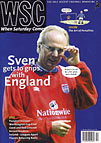 Players from eastern Europe may soon have the same rights as their EU team-mates. Simon Evans does not think that is any reason to panic
Players from eastern Europe may soon have the same rights as their EU team-mates. Simon Evans does not think that is any reason to panic
The Bosman ruling may have had a massive impact on the game but until now its reach has been restricted to the borders of the European Union. Whatever deal is reached over the new transfer system, it is almost certain to involve an extension of the Bosman principle to those countries with associate agreements and trade deals with the EU – and that means most of eastern Europe.
Players from former eastern bloc countries have remained restricted by the right of clubs to charge a transfer fee when they reach they end of their contracts, and not only when the deals involve clubs from outside the EU. Hungarian midfielder Tibor Balog is awaiting a case in front of the European Court of Justice to determine whether non-EU players working inside the EU have the same rights as EU nationals, after his Belgian club Charleroi demanded a fee for him when he was out of contract.
All the signs are that Balog will win, though it is more than likely that the new deal on transfers will pre-empt any ruling by bringing non-EU players into the Bosman framework anyway. Balog’s case is not the only one one to hint at the shape of things to come. Celta Vigo’s Russian Valeriy Karpin won a court judgment in Spain saying that players from countries with EU associate status – most of eastern Europe plus others such as Morocco, Tunisia and Algeria – should enjoy the same rights as EU players. The Polish basketball player Liliana Malaja won a similar case in France, arguing that she should not count as a foreign player.
The ultimate effect of these cases is likely to be the outlawing of any restrictions on the number of players from such countries that may be fielded by any club. Not surprisingly, this prospect has caused some excitement in the British media. The combination of Eurocrats, football and immigration is too good a story to miss. After the Karpin case, Michael Butcher wrote in the Observer on December 3 that: “The day when Manchester United, Millwall or Mansfield Town can field a team comprising three Bulgarians, two Romanians, two Czechs, two Poles, a Slovak and a Moroccan – and no Britons – came a step closer this week.”
The key word here is, of course, “can”. Under the current rules there is nothing to stop Manchester United fielding a team of 11 Dutchmen nor Millwall a squad of Viennese. Mansfield Town could pick a starting line up entirely composed of players from Liechtenstein, Norway and the Faroe Islands.
But they don’t, and there appears to me little reason why the arrival on the market of Hungarians, Poles and Slovenians should force a major change. Of course the big fear of the PFA and others is that the availability of good east European players willing to play for relatively low wages will lead to the spreading of the Chelsea syndrome to the lower divisions.
It’s true that the change is likely to affect us more than any other EU country as Britain has the strictest rules of any member state on work permits for east European players. A player from outside the EU must have played in 75 per cent of his national team’s games in the past two years and the British club who signs him has to prove his worth by making him one of the three top paid players at the club. This draconian restriction has ensured that all but a handful of players from eastern Europe are ineligible to play in Britain – but it will have to go under the new regime.
Southampton’s European scout, former Leeds and England defender Terry Cooper, is one of the few scouts in Britain who regularly visits eastern Europe to look for talent. He believes that while the new rules will see more players given a chance in England, a flood is unlikely. “There would be more players able to come over, but a manager is always going to look and see if the player is really better than what he has got,” he says.
The evidence of the post-Bosman era suggests many Nationwide bosses are reluctant to take on foreign players. Scandinavians are still cheaper than English players but while there are plenty of trialists in the lower divisions only a fraction have been offered deals. In the past decade, the work permit rules have ensured that the best talent from the east has moved to Germany, Spain and Italy. Of those countries that have been open to east European players, only Germany has really seen a flood of players to lower division clubs.
The case of Belgium, which has very few limits on players of any nationality, backs up the view that a huge rush from the east is unlikely to last. Belgian clubs have discovered wage demands have risen quickly as the players’ agents learn the going rate. Cooper believes the same would happen in Britain. “They won’t be cheap for long. They all have people looking after them and they will aim for the best deal they can get.”
Ah yes, the agents. If Gordon Taylor really wants to keep the east Europeans out of England, perhaps he should take a few Nationwide League chairmen and managers out to Kiev to meet the Ukrainian and Russian agents and get acquainted with their famed methods for closing a deal. Perhaps we won’t need to worry about an all-Macedonian Mansfield just yet.
From WSC 170 April 2001. What was happening this month